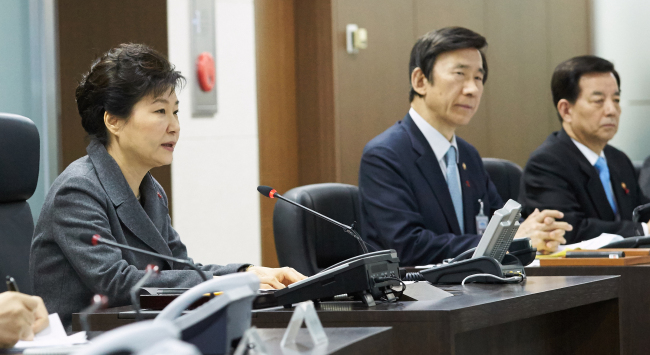The failure by Seoul and Washington to curb the growth of Pyongyang’s nuclear weapons program drew heavy criticism Wednesday after the communist regime claimed to have successfully conducted a hydrogen bomb test.
 |
| President Park Geun-hye presides over a National Security Council meeting at Cheong Wa Dae on Wednesday. (Yonhap) |
Seoul and Washington have so far focused on applying sanctions against Pyongyang’s development of nuclear arms and missiles, and persistently called for “sincerity” in its denuclearization commitments.
But such a hard-line stance has thus far failed to lure Pyongyang into meaningful talks to at least freeze the regime’s nuclear activities, allowing it to continue upgrading its nuclear technology, critics pointed out.
“So far, Seoul and Washington have focused on applying sanctions and putting pressure on the North, believing that it is unlikely to abandon its nuclear program,” said Koh Yoo-hwan, a North Korea expert at Dongguk University.
“They have also persistently demanded that the North should take presteps for the reopening of the denuclearization talks, although Pyongyang has itself suggested talks and made some fence-mending gestures.”
The U.S. has so far maintained a policy of what analysts called “strategic patience,” which some have derided as “strategic ignorance” or even a “strategic coma.” Washington has been increasingly reluctant to engage with the North amid the deterioration of bilateral ties.
After the breakup of the 2012 “Leap Day Deal” between Washington and Pyongyang, the bilateral relationship was caught in a downward spiral.
The deal, under which Pyongyang agreed to put a moratorium on nuclear and missile tests in return for 240,000 tons of “nutritional assistance,” was breached after the North fired a long-range rocket less than two months later — an incident that deepened mutual distrust.
Bilateral friction further increased in late 2014 when the U.S. blamed the North for the cyberattack on Sony Pictures Entertainment, and imposed additional sanctions against it in retaliation for the alleged hacking.
U.S. President Barack Obama’s abrupt allusion to the collapse of the North Korean regime early in January 2015 also fueled bilateral animosities, which analysts said encouraged Pyongyang to accelerate efforts to secure what it calls self-deterrence measures.
Amid the deterioration of ties, Pyongyang was seen moving to restore its ties with the U.S. through a set of proposals. Last year, Pyongyang called on Washington to stop its military exercises with Seoul in return for a moratorium on its nuclear tests. But the proposal was spurned by the allies.
Pyongyang has also called for talks over a peace treaty with the U.S. to replace the current Armistice Agreement. But Washington has dismissed the notion as insincere, apparently viewing the proposal with suspicion that the North would take advantage of it to expel U.S. forces from the South.
With the U.S. presidential election slated for November, U.S. policymakers are unlikely to pay more attention to the North Korean issue, analysts said, highlighting the need for Seoul to make more efforts to engage with the North and prevent it from further developing its nuclear program.
In line with the U.S.’ policy stance, Seoul has also maintained a tough stance over the North, calling for more sincerity from Pyongyang instead of its verbosity about improving bilateral ties. It has continued to maintain economic sanctions against the North and ratcheted up pressure on the North to give up its nuclear ambitions in cooperation with the U.S., China and other major powers.
Seoul has so far focused its efforts on unification policy, but critics argue the policy has given an impression that the South seeks to forcibly absorb the North into its democratic system, rather than seeking coexistence with the North. Pyongyang has called the policy “ill-intended.”
Experts say that Seoul should be more active in contriving more creative ways to bring the North to the table for dialogue and to resume the denuclearization process.
“Seoul has not been active enough to tackle the nuclear issue so far. The centerpiece of the North Korean problem is the nuclear issue, but it has not been effectively addressing the issue,” said Park Won-gon, security expert at Handong Global University.
“Seoul has long called for Pyongyang’s sincerity. But the North cannot be a country from which we can anticipate sincerity. It has, rather, to be managed or taken care of. Seoul should exert more efforts to persuade China and the U.S. to work out a coordinated resolution to the North Korean conundrum.”
Over the past year, Seoul has called for unconditional “exploratory dialogue” with Pyongyang, as the latter has rejected the offer for official multilateral denuclearization talks — as Seoul and Washington have demanded that Pyongyang first take sincere denuclearization steps.
But the efforts have also failed due in large part to bilateral distrust.
By Song Sang-ho (sshluck@heraldcorp.com)

